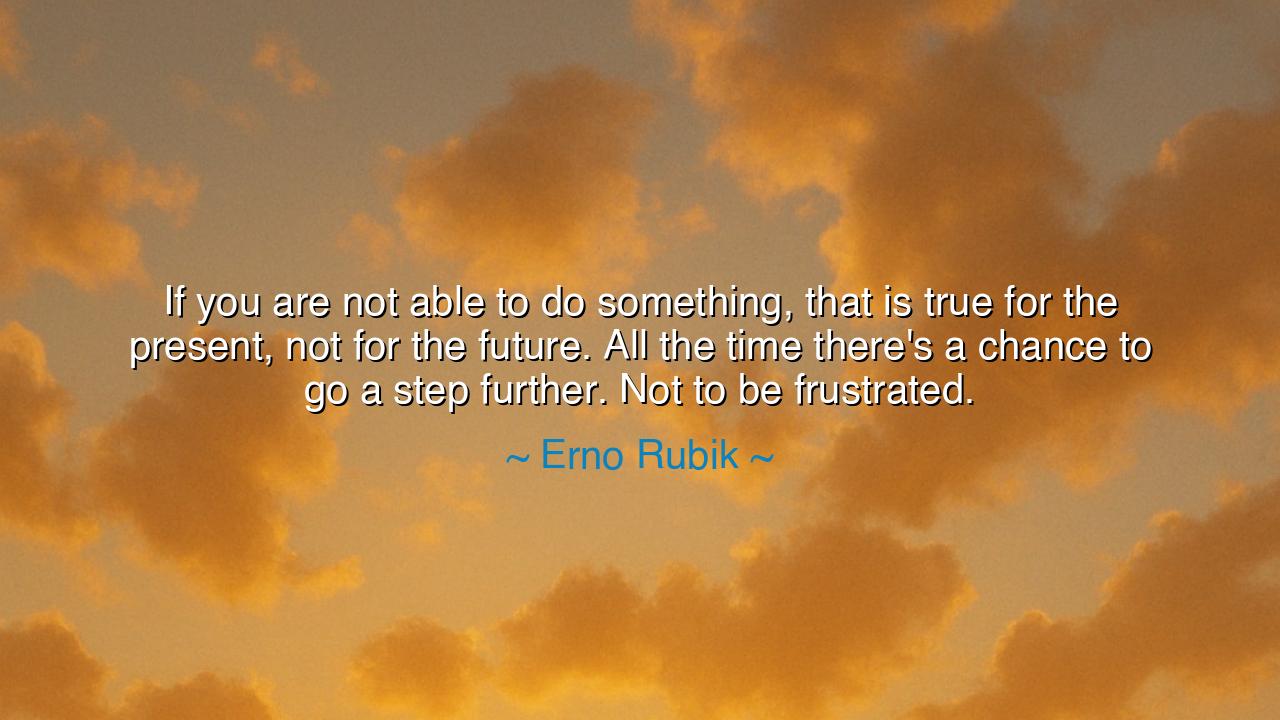
If you are not able to do something, that is true for the
If you are not able to do something, that is true for the present, not for the future. All the time there's a chance to go a step further. Not to be frustrated.






"If you are not able to do something, that is true for the present, not for the future. All the time there's a chance to go a step further. Not to be frustrated." These words spoken by Erno Rubik, the inventor of the Rubik's Cube, carry a powerful message of hope, perseverance, and the ever-present opportunity to improve. Rubik’s words invite us to understand that our present limitations are not permanent, and that the future is full of possibility and growth. Just as the Rubik's Cube can seem impossible at first, so too can life’s challenges appear overwhelming. But Rubik reminds us that through patience, determination, and the willingness to step forward, we can always make progress, no matter how difficult the journey may seem.
The ancient philosophers were no strangers to the idea of growth through adversity. In Socratic thought, the pursuit of knowledge was not a linear path, but rather a journey filled with setbacks and moments of uncertainty. Socrates himself said, "I know that I am intelligent, because I know that I know nothing." His words spoke to the humility required to acknowledge one’s limitations, but also to the wisdom in understanding that knowledge is an ongoing pursuit—one that can never be confined to a singular moment of success. The idea of progress was deeply embedded in the ancient world, where learning was viewed as an evolving process, and the pursuit of wisdom demanded continuous effort. Socrates, in his humility, would never have allowed a single moment of failure to define his journey, and neither should we.
Rubik's statement is also reminiscent of the teachings of Aristotle, who believed in the concept of virtue as something that could be developed over time. According to Aristotle, achieving greatness was not about a singular moment of brilliance, but rather a continuous practice of doing, learning, and growing. To him, virtue was a habit that could be cultivated, a process of doing good over and over again. The true path to success, for Aristotle, lay in one’s ability to continue striving, step by step, even when the goal seemed far away. In this sense, Rubik’s call to keep moving forward echoes the ancient wisdom that growth is never instant, but rather a gradual unfolding that requires persistence and an unyielding belief in the possibility of improvement.
Consider the example of Leonardo da Vinci, whose genius spanned multiple fields: painting, engineering, anatomy, and science. Da Vinci’s early works were not masterpieces from the start. His first attempts at engineering were filled with mistakes, and his early anatomical studies were crude by modern standards. But Leonardo did not let these early failures stop him. Instead, he used them as stepping stones, continually improving his techniques and understanding. The Vitruvian Man, one of his most famous works, is not just an illustration of human anatomy—it is the culmination of years of study, trial, and error. Leonardo embraced the idea that every moment of frustration was simply part of the process of learning and achieving greatness.
The lesson that Rubik imparts is that failure is not a permanent state, but a temporary condition that can be overcome. If we are unable to do something today, it does not mean that we will be incapable of doing it forever. Just as the Rubik's Cube, though seemingly impossible to solve at first, becomes manageable with time and practice, so too do the challenges of life. We must not let our frustrations at our present limitations blind us to the possibilities of the future. Instead, we must view each obstacle as a lesson, a chance to grow and expand our abilities. Patience, dedication, and a willingness to keep trying are the keys to moving beyond frustration.
There is a great wisdom in Rubik’s words, for they remind us that progress is not always immediate, and that failure is a natural part of the journey. If we can learn to accept the present moment as part of the process, we can open ourselves up to the immense potential for growth in the future. Frustration arises when we expect perfection in the present, but true success lies in persevering through those moments of struggle. Like the Rubik’s Cube, life is a puzzle that we can only solve by taking it step by step, learning from each twist and turn, and trusting that, in time, the pieces will fall into place.
The practical action we must take is to embrace persistence in the face of challenges. Whether in work, relationships, or our own personal development, we must give ourselves the space to fail and the freedom to try again. By shifting our perspective from failure to learning, we open ourselves up to infinite possibilities. Just as Rubik found joy in the continuous process of solving his puzzle, so too can we find fulfillment in the journey of growth and self-improvement. We must never let frustration blind us to the future, for each day offers a new chance to take that next step forward.
In conclusion, let us remember Rubik’s wise words as a reminder that the path to success is not a straight line, but a winding road full of opportunity, learning, and growth. No matter where we are today, we must believe in the future, trust in our ability to improve, and never give up on taking that next step. For just as the Rubik’s Cube can be solved one twist at a time, so too can our lives be shaped by the small, consistent steps we take toward our goals and dreams.






AAdministratorAdministrator
Welcome, honored guests. Please leave a comment, we will respond soon